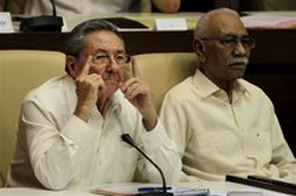Castro says Cuba to cut spending
HAVANA: Raul Castro announced Saturday that Cuba will cut spending on education and health care, potentially weakening the building blocks of its communist system in a bid to revive a foundering economy.
The former defense minister who took over the presidency last year called state spending "simply unsustainable" and said the cash-strapped government would reorganize rural schools and scrutinize its free health care system in search of ways to save money.
But he vowed that the island will not see fundamental change even after he and his older brother and predecessor, Fidel Castro, are gone.
"I wasn't elected president to return capitalism to Cuba," Raul Castro said, "or to surrender the revolution" — the armed uprising that toppled dictator Fulgencio Batista a half century ago.
"I was elected to defend, build and perfect socialism, not destroy it," he said to a standing ovation from lawmakers in Parliament.
He framed those remarks as a response to U.S. Secretary of State Hillary Clinton, who has said Washington wants to see economic and social reforms in Cuba before doing more to improve relations.
Castro reiterated his willingness to negotiate better relations with the United States and acknowledged a "decline in the aggressiveness and anti-Cuban rhetoric" during the Obama administration.
He said he was ready to talk about "everything here in Cuba, but also everything there in the United States," referring to Washington's 47-year-old trade embargo.
Castro said Cuba "won't negotiate our political or social system and we won't ask the United States to do so. We should mutually respect our differences."
Raul was Fidel Castro's hand-picked successor for decades and took power from his brother without an election in February 2008.
Cuba argues its system is democratic because voters ratify a slate of official parliament candidates, and lawmakers in turn choose the Council of State, the supreme governing body. The parliament list is drawn in part from municipal leaders who are picked during neighborhood gatherings where participants vote by show of hands.
Raul Castro made an unusual mention of the mortality of his ailing, 82-year-old brother — something top officials almost never do in public — scoffing at those who think Cuba's political system will crumble after "the death of Fidel and all of us."
"If that's how they think, they are doomed to failure," Castro said.
Defiant guarantees for the future came only after a heavy dose of grim economic news. Without mentioning specifics and while insisting education will not suffer, he said some students and teachers in rural areas will be reassigned to nearby cities, saving time and money needed to transport 5,000 educators long distances between home and work.
He also said cuts were in store for the universal health care system, which, along with free education through college, subsidized housing and food provided on a monthly ration system, forms the basis of the communist way of life that the Castro brothers have spent 50 years building.
Before Castro spoke, lawmakers established a new office of government finances to crack down on corruption and keep better watch on the state's often mysterious spending patterns.
The new comptroller's office is a break from the past, when Fidel Castro lorded over the national treasury. Cuba's former "Maximum Leader" often raided it for pet projects after taking power in 1959 and continued to micromanage minuscule spending details in subsequent decades.
Taking scrutiny of Cuba's economic books away from the presidency reflects the businesslike, military mentality of the younger Castro, an army general who has demanded better accountability from all leaders.
Cuba's government dominates well over 90 percent of the economy and pays an average salary of about $20 a month, meaning some employees steal food, electronics and anything else they can at work and sell them on the black market to make ends meet.
While it may help limit graft, the new office likely will do little to fill sparse state coffers. Three hurricanes last summer caused more than $10 billion in damage and wiped out grain that the government had stockpiled to protect against rising commodity prices. The global recession has since cut into export earnings and caused budget deficits to soar, leaving Cuba short of cash.
Things are so dire that on Friday, authorities postponed a Communist Party congress that would have been the first of its kind in 12 years.
At the same time, the government decreased the projection for 2009 growth to 1.7 percent. As recently as December, central planners boasted Cuba would grow 6 percent this year, but they count as output government spending on social programs.
Tourism has remained strong, with the number of foreign visitors on pace to slightly exceed last year's record 2.35 million, which generated $2.7 billion. Still, Tourism Minister Manuel Marrero said revenue from those visitors is down about 10 percent in 2009.
"Tourism is growing, tourists keep coming, but they have changed the way they travel," Marrero said outside the parliament meeting. "They are coming for less time, trying to come with a lot of discounts, and that has caused a decline in profits."






